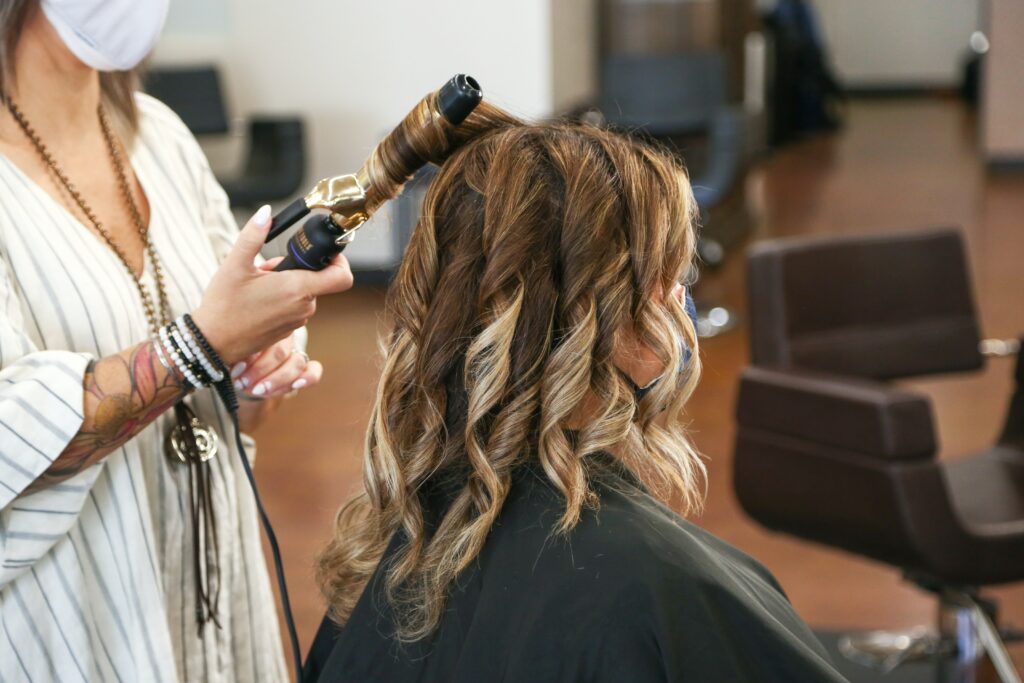
It’s often said that educating people can be one of the most rewarding things you can do. If you’re thinking about passing on your knowledge to the next generation of budding hairdressers, barbers or beauticians, you may be wondering what the next steps are to take.
In this guide, we take a look at the key considerations when becoming a hair or beauty educator; we also talk to two industry professionals who have taken the leap to find out what becoming an educator really entails.
What to consider when becoming a hair or beauty educator
There are different routes to becoming a hair or beauty educator. You should think about your personal preferences, ambitions and career goals before you pick which route to take to ensure it’s right for you.

Becoming affiliated with a professional brand
Hair and beauty brands are always looking for enthusiastic, skilled and knowledgeable educators. It can be a fantastic side hustle – earning an income in addition to your regular day job. Aside from the extra money, being an educator for a brand can open up a world of opportunities. You’ll be associated with a brand, and as a consequence, you can make connections across the beauty and hair industries. You shouldn’t underestimate how many doors a brand can open…
But if you do want to be an educator for a brand, it’s really important that you choose a brand that you are passionate about. The brand should align with your values. You should understand their mission and agree with it.
If you do find a brand that aligns with your values, what can you expect from becoming an educator with a brand? What are the advantages and disadvantages? We explore these below.
The advantages of becoming affiliated with a professional brand:
1. You’ll benefit from back office support.
If you become an educator for a brand, you’ll generally have much of the ‘admin’ side of things taken care of. Things like setting up an event, arranging a venue, marketing the event and taking payment will all be taken care of.
2. It’s straightforward.
Becoming an educator with many brands simply involves submitting an application and attending training, and if you meet their standards, you’ll be added to their roster of educators.
3. You’ll benefit from being part of a brand.
The majority of beauty and hair brands are continually running extensive marketing campaigns. Becoming an educator with a brand means you’ll benefit from these marketing efforts.
4. You’ll make great connections and contacts.
By becoming an educator with a brand, you’ll meet many really well-connected people in the beauty and hair industries. In fact, if you become an educator for a well-regarded brand, then you’ll have more chances of meeting the really high-profile industry stars that you’d probably struggle to meet otherwise.
The disadvantages of becoming affiliated with a professional brand:
1. You’ll have to follow rules.
Working as an educator for a brand will usually mean you have many rules and regulations to follow. For example, you may be prohibited from talking about a competitor’s product line (even if it’s really good and you love it!). Beauty and hair companies are also (understandably) protective of their brands, so you may also have to follow rules about posting to social media.
2. You’ll have to act like an employee.
As an educator, you won’t be an employee of the brand, yet you’ll be expected to act like one. Yes, you’ll be able to decline classes if you don’t want to do them, but if you accept a class, you’ll often be expected to wear a company uniform, conduct your classes in a pre-defined way, prominently display the company branding, and more.
3. You’ll have to pay for your training and travel.
Although being a beauty or hair educator can be a great way to earn money as a side hustle, you will need to factor in an initial outlay on training and the ongoing costs of travel, accommodation and meals (if you choose to teach classes outside of your local area).
4. Classes are not always guaranteed.
If you want to become an educator to earn a consistent income, the branded path may not be for you. Why? Because if a class doesn’t meet an attendance threshold (basically, not enough bookings), then a brand will usually choose to cancel it. If you are still keen to follow the branded path, check the brand’s class cancellation policy before you make the leap.
If reading that has made you think twice about becoming an educator for a brand, there is another way.
The way of the independent educator.
Becoming an independent educator
Many hairdressers and beauticians are choosing to become independent educators. Their reasons for doing so vary, but if you’re motivated and ambitious enough, you can become a successful educator without supporting a beauty or hair brand. The independent path can be challenging, but it can also be immensely rewarding. We’ve weighed up the advantages and disadvantages of the independent path below.
The advantages of becoming an independent educator
1. You’ll be your own boss.
As an independent hair or beauty educator, you’ll answer to no one. You’ll be free to educate in your own style, promote the products and lines that you’re genuinely passionate about and establish your own personal brand.
2. You can maintain your integrity.
Whilst brand educators may have to occasionally promote products that they don’t believe in; independent educators are free to pick and choose what they are willing to promote. Yes, you won’t benefit from all the support of a brand, but you’ll maintain your integrity. That’s something you can’t buy.
3. You won’t be guilty by association.
Brands can change over time. What was once your favourite beauty or hair brand can sell out, change the mission or launch a marketing campaign you completely disagree with. As an independent, your reputation won’t be harmed by association with a brand.
4. You’ll be able to teach on your terms.
One of the most enjoyable things about being an educator is the teaching part! It’s an obvious point, but if you don’t get to teach in your style, then it’ll make it a whole lot less enjoyable. Whereas brand educators will have strict guidelines on teaching, as an independent, you’ll be free to educate your way.

The disadvantages of becoming an independent educator
1. Plenty of admin.
As an independent, you must arrange the classes, sort out venues (or webinars) and take payments. You’re effectively self-employed, so if you’re planning on becoming an educator to generate a source of income, you’ll need to be realistic about your earning potential and how much work you’re willing to put in to make it a success.
2. You’ll be responsible for building your own brand.
Unlike a brand educator, it’s up to you to do your own marketing and promotion. Not only will you need your own website or blog, but you’ll need to grow an audience on social media and YouTube. You’ll need to be willing to reach out and pick up the phone. Basically, you’ll need to let the hair or beauty worlds know that you exist!
3. You’ll have costs to pick up.
If you want to put on a class or attend a trade show, you’ll have to cover the costs of doing so. Unlike a brand educator, who will have these things taken care of, you’ll need to make sure you’ve got enough money to cover these costs and get started.
4. You’ll have to stand out.
The beauty of social media and YouTube is that it’s easier than ever for someone to build an audience as a hair or beauty educator. But this also means there’s an enormous amount of competition in becoming a well-recognised educator. To be successful as an independent educator, you’ll need to have a unique point of difference, a niche focus or the ability to create genuinely valuable and exciting content.
Related: Working In A Salon vs Freelancing– Advice for Hair & Beauty Professionals
Don’t just take it from us. We asked Jaymz Marsters about his experience as an independent educator:

“Being an independent educator has allowed me to educate and express myself in an honest setting allowing my viewpoints to not be clouded by brand values. We can educate how we like, when we like and charge what we feel our knowledge and skill set are worth. Hairdressers naturally gravitate towards being exclusive to one brand, but it’s becoming more popular to attend education by independent educators who showcase the benefits of being brand neutral.”
Related: Ask the Expert With Jaymz Marsters: Social Media Special
Can you do both?
Becoming a beauty or hair educator doesn’t have to be an either/or decision. There is a third way. There are many people who decide to combine being an educator for a brand as well as educating an independent. This provides you with the benefits and support of a major brand, as well as the freedom to educate independently when you want to. So, if you’ve read the information above and are struggling to decide what route will be best for you, don’t worry. Other educators prove you can do both.
Take Tia Lambourne, who has been doing both branded and independent education:
“I have been an independent educator for over three years, it’s been a whirlwind, and I’ve loved every second! I love my freedom when teaching; I can give honest reviews on products and share my tips and tricks with other stylists. Then Redken reached out to ask me to be an Official Advocate. I was so excited; they saw how much I loved their Shades EQ range and that I repost formulas to inspire other stylists. I love that Redken is giving me another platform to help more stylists; I’m really excited to see where our journey takes us!”
If you’re looking to become a hair or beauty educator, these are some of the options open to you. Your appetite, your motivation, your passions and your interests will determine which route is correct for you.
Shop professional salon supplies at Salons Direct today!
Follow Salons Direct on Instagram
Discover the Salons Direct blog, your trusted source for industry news, product releases, how-to guides and more!
You may also enjoy…
10 Viral TikTok Products Hair & Beauty Professionals Can Buy From Salons Direct | Should you offer a ‘Mirrorless Service’ in your salon? | How To Create A More Inclusive Salon Business


